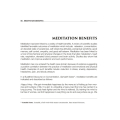fruitful outcomes : ค้นหาหนังสือธรรมะ หน้า 5 / 6
หน้าหนังสือทั้งหมด

40
The Quest for Peace: The Two-State Solution in the Israel-Palestine Conflict
Israel and Palestine
U.S. core interests in the region include peace between Israelis and Palestinians, which would have as a corollary peace between Israel and all Arab countries. The only solution
The pursuit of peace in the Israel-Palestine conflict hinges on the two-state solution, which aims to protect Israel's existence and Palestinian rights. Achieving this requires strong Palestinian lead

43
Reassessing U.S. Policy Toward Syria and Democracy in the Middle East
A new policy toward Syria also needs to recognize the country for what it is: a small country without massive ambitions or ideological crusades, trying to maintain some role in the region. The confron
This text discusses the need for a nuanced U.S. policy toward Syria, recognizing its limited ambitions while encouraging a shift away from its spoiler role in Lebanon and alignment with Iran. It furth

80
Understanding Dhammakāya and its Significance in Buddhism
mental qualities128 or purity,129 or identifies it with realities to be
attained or experienced spiritually by noble disciples through the
penetration of the noble paths.130 In one instance, he connec
This text examines the term dhammakāya as articulated by Buddhaghosa, linking it to spiritual realities and teachings of the Buddha. It highlights the role of dhamma-vinaya as a guiding principle and

96
Understanding Merit and the Law of Cause and Effect
Merit Results
We benefit from merit in four levels:
1. The mind -- improving the quality and the potentiality of the mind.
2. The personality -- improving our demeanor and the way we project oursel
Merit affects our lives on four levels: mental improvement, personality enhancement, lifestyle benefits, and societal contributions. The Law of Karma states every action has a corresponding consequenc

18
The Dangers of Self-Destructive Behaviors
self-destructive behavioural vices as drinking, nightlife, too much indulgence in sensual pleasure, gambling, associating with bad company, and laziness. These actions may not necessarily be considere
This text highlights various self-destructive behaviors such as excessive drinking, nightlife, and indulgence in pleasures that can lead to addiction and negative life outcomes. It warns against assoc

22
The Simile of the Man in the Mire
Now this again, Master Kassapa, is evidence to me that there is neither another world, nor rebirth other than of parentage, nor fruit and result of deeds well - done and ill - done.'
9. 'Well then, P
In this passage, Master Kassapa uses a simile to illustrate the complexity of existence and moral actions. He compares a man trapped in mire to the wider concepts of life, illustrating that actions, l

98
Understanding Worthy and Unworthy Gifts
This Life Next Life
96
Asappurisadanasutta
Bhikkhus, these five are unworthy gifts.
What five ?
Giving disrespectfully,
giving without heart and thought,
not giving with one's own hand
The Asappurisadanasutta discusses the nature of giving, categorizing gifts into two types: unworthy and worthy. Unworthy gifts are defined as those given disrespectfully, without genuine intent, not g

12
Asapurisaḍāṇa Sutta - The Worthiness of Gifts
2. Asapurisaḍāṇa Sutta
Bhikkhus, these five are unworthy gifts.
What five ?
Giving disrespectfully,
giving without heart and thought,
not giving with one’s own hand,
giving something which is to be d
The Asapurisaḍāṇa Sutta explains the nature of giving in Buddhism, distinguishing between unworthy and worthy gifts. Unworthy gifts include those given disrespectfully, without thought, not given from

60
The Voice of Abandoning: Velama Sutta
The Voice of Abandoning
7. Velama Sutta
"Householder, regardless of whether a gift is coarse or refined, if it is given inattentively, disrespectfully, not with one's own hand, as if throwing it away
In the Velama Sutta, the Buddha emphasizes the importance of the quality of gifts over their material worth. Whether a gift is simple or elaborate, the intention behind it matters greatly. Gifts given

90
Dana Sutta: The Nature of Giving
The Vintage of Absoiving
9. Dana Sutta
5. "he gives a gift with the thought, 'Just as there were the great sacrifices of the sages of the past --
Atthaka, Vamaka, Vamadeva, Vessamitta, Yamataggi, An
The Dana Sutta emphasizes the importance of giving with a mindful intention, drawing parallels with great sages of the past. It illustrates how such acts of generosity lead to a serene mind and joyful

92
The Victory of Abandoning: Insights from the Dana Sutta
The Victory of Abandoning
9. Dana Sutta
Those 6 things Then, having exhausted that action, that
power, that status, that sovereignty, he is a returner,
coming back to this world.
7. "-- but with the
The Dana Sutta presents profound insights on the nature of giving and its consequences in the spiritual journey. It describes how the mindset behind acts of generosity can influence their outcomes—whe

94
Understanding Merit and Demerit: The Law of Karma
The opposite of merit is demerit, or ‘sin’. Demerit is the product of bad deeds. Bad deeds cause ‘bad karma’. Demerit is a negative energy that is created when a bad deed is performed: mentally, bodil
The opposite of merit is demerit, representing the consequences of bad deeds which cause negative karma. Both good and bad deeds are governed by the Law of Karma, where actions determine outcomes in t

5
Understanding Dhamma Through the Teachings of Luang Por Dattajevedo
This book is a translation into English of a lecture given by a Most Venerable Thai monk in his native tongue. In order to convey the content accurately and understandably to an international readersh
This book presents an English translation of a lecture by Luang Por Dattajevedo, a respected Thai monk, emphasizing the importance of ethical learning and teaching in understanding Dhamma. His charism

90
Meditation Benefits
86 MEDITATION BENEFITS
MEDIATION BENEFITS
Meditation has been linked to a variety of health benefits. A review of scientific studies
identified favorable outcomes of meditation which include: relaxa
Meditation is associated with various health benefits such as relaxation, concentration, and increased awareness. Scientific studies reveal its positive impact on metabolism, heart rate, and brain act

141
The Importance of Merit in Life
Merits are the fruits of good deeds. Good deeds performed through generosity, morality and mental cultivation all bring about merit. The fruits of good deeds converge to become a bright merit sphere a
Merits are the positive outcomes of good deeds, which include generosity, morality, and mental cultivation. These merits form a positive 'merit sphere' within an individual, aiding them during challen

54
Understanding Kamma and Its Impact on Life Choices
"And what is Kamma? Kamma is action with intention. Am I always being mindful of what I am doing? Am I using my mind and listening to my mind? Am I listening to my outside voice or my inside voice? Th
Kamma refers to action with intention. It emphasizes the need for mindfulness in our actions and decisions, distinguishing between our external influences (kilesa) and our internal compassionate voice

114
Meetings with a Dhamma Master
Meetings with a Dhamma Master
systemized, or categorized, the Dhamma, and he was able to individualize the lessons so
that the people He was talking to would have the ears to hear, and the wisdom to
In 'Meetings with a Dhamma Master,' the importance of individualized Dhamma teachings is highlighted. Just as the Buddha demonstrated patience with his students, teachers today must equally nurture ea

121
Understanding Kamma and Its Effects on Life
Suzanne Jeffrey
" Meditation and concentration help us to discover and understand all of this. One of our jobs, as you well know, is to train the future leaders so that they will understand this, too
In this discourse, Suzanne Jeffrey emphasizes the significance of meditation and concentration in understanding Kamma, which refers to the actions we take and their intentions. We are tasked with trai

125
Understanding Kamma and the Importance of Intentional Action
Suzanne Jeffrey
"Kamma, then, applies to body, speech, and thought: action with intention. And the actions that we perform throughout our lifetimes reflect negatively or positively on the people arou
Suzanne Jeffrey discusses the significance of Kamma as it relates to body, speech, and thought, emphasizing intentional action's effect on relationships with family, teachers, and spiritual leaders. T

93
Understanding Merit and Its Impact on Life
MERITS
Everybody wants to be rich, beautiful and smart. Nobody wants to be poor, ugly and dumb. But how come some people are born lucky and other are not? The answer is because of ‘merit’, or the lac
Merit is the product of good deeds and serves as a positive energy that can lead to being rich, beautiful, and smart. It encompasses virtue and goodness, influencing one's present and future based on
